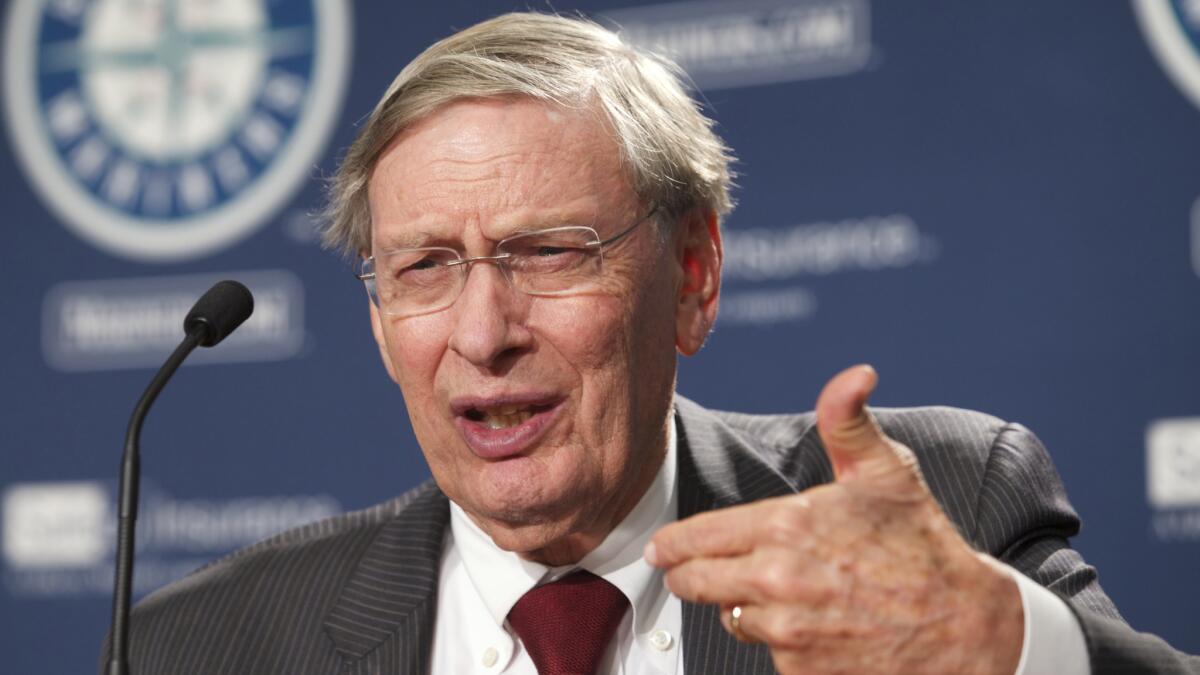Q &A with MLB Commissioner Bud Selig

MLB Commissioner Bud Selig speaks during a news conference in Seattle on Sept. 10. Selig says baseball isn’t losing its popularity among young people.
- Share via
After the last out of the World Series, Bud Selig will present the championship trophy to the winning team. That will be the final presentation for Selig, 80, who is set to retire in January after 22 years as commissioner of Major League Baseball.
On his way out of office — and into teaching roles at Wisconsin and Marquette — Selig sat down for an exit interview with The Los Angeles Times.
Q: The original owners of the Los Angeles franchises — the O’Malley Dodgers and the Autry Angels — each sold their teams in the 1990s, saying baseball had gotten too big and too expensive for family ownership. Do you believe that to be true, and what does it mean for the game?
A: [Angels owner] Arte [Moreno] has proved that a family can run the business. In some cases, it wasn’t what it was 40 or 50 years ago. But, by the same token, there are still individual ownerships. Look, life has changed, and the business is far more complex than it was in the ‘40s, ‘50s, ‘60s and ‘70s.
Q: When you implemented revenue sharing, you said you wanted to make sure fans in every market had hope and faith. Although the money each team takes in is not equal — and probably will never be — are you comfortable that every team has a fair chance to win if it is managed smartly?
A: Yes. Yes. The answer, unequivocally, is yes. The one thing I wanted, when I set out to share money, I wanted management to take over. I think we have achieved that.
Q: You have said the owners — your bosses — should judge you by the value of their franchises. Those values are at an all-time high, but what should fans think about that criterion, and how should fans judge?
A: What I said is it is a composite of everything, including labor peace. If assets have risen, that means the sport is having huge attendance, that means the sport is doing the things I think it should do, and so I think if assets are going up, that means we are pleasing our fans, which means we are doing the right thing.
Q: Dallas Mavericks owner Mark Cuban, who tried to buy the Dodgers and three other major league teams, recently said “nobody recognizes” baseball stars and said you and the league have not marketed them properly. That criticism is not uncommon, particularly in relation to baseball’s young stars. How do you respond?
A: I don’t agree with that. We are going to have gross revenues close to $9 billion. We are going to have the 10 greatest years in attendance in the big leagues, as well as in the minor leagues. Mike Trout is a perfect example here. We wouldn’t be doing the business we are doing today if we weren’t marketing our stars. So we are marketing our stars.
Q: Revenue is good, attendance is good, and yet the sport faces stagnation as its fan base skews older. What can you do to get the younger generation interested in baseball?
A: I’m telling you that’s not right. I’ve heard that for 56 years now. I’ve heard that since 1958 — we’re losing the younger generation. You look around here tonight, you’ll see more kids than any other sport. Now, we need to work on things, but we couldn’t be as popular as we are [without the younger generation]. This sport is more popular than ever before. I’ve talked to a fair number of clubs who think their demographics are fine. And they are.
Q: The Dodgers hit the jackpot on their local television deal, but most of Los Angeles could not see the games this season. Franchise values and team revenues have skyrocketed in large part because of local television money but, as tech-savvy viewers cancel their cable and satellite subscriptions in favor of watching what they want on the Internet, how concerned are you that baseball’s financial bubble is about to burst?
A: I think it is something we have to watch in the future. While I am very optimistic, that is a fair question, and we need to watch it.
Q: You have appointed a committee to determine how to speed up the pace of the game. The single greatest factor in long games appears to be longer commercial breaks. What can you do about pace of game?
A: There is a lot we can do, and we are working on it. In the off-season, we have to address some things and work it out.
Q: But not on the TV end? Is there too much money in longer commercial breaks to consider making them shorter?
A: Not only that. In a nine-inning game, you are going to get the same commercials in. The important thing, I think, is the play on the field. That is the difference.
Q: The Dodgers have not said whether they intend to remain at Dodger Stadium for the long term or consider moving to a new stadium. As a fan and a historian of the game, would you like to see the Dodgers stay at Dodger Stadium?
A: If it’s possible, you bet. There is a great history there. As much history as we can preserve, we ought to try to do that.
More to Read
Go beyond the scoreboard
Get the latest on L.A.'s teams in the daily Sports Report newsletter.
You may occasionally receive promotional content from the Los Angeles Times.











